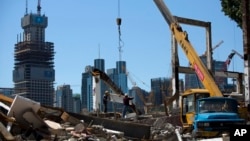A top U.N. official is expressing concern about whether China-backed development projects overseas will have adequate protections for human rights.
The Office of the High Commissioner of Human Rights is investigating the link between project financing and safeguards for human rights at a time when China has successfully led the creation of two banks, the Asian Infrastructure Investment Bank and the New Development Bank of BRICS-Brazil, Russia, India, China and South Africa.
Investigations by the UNHCHR show Chinese companies and financing institutions have little concern about human rights violations surrounding projects promoted and financed by them across different countries, including some in Africa.
This concerns the United Nations because Chinese institutions and companies are funding more projects globally than the World Bank, the U.N.’s independent expert on finance and human rights said at a press conference Monday in Beijing.
Chinese companies and institutions are also "difficult to approach or insensitive to respond to concerns raised," Juan Pablo Bohoslavsky said.
There has been no immediate official Chinese reaction to Bohoslavsky’s comments.
Chinese-financed development projects have contributed in several countries to serious violations of human rights, including forced evictions, arbitrary detention, and violations of the right to life, the U.N. agency contends.
Development projects in several countries – including Sri Lanka, Myanmar and Kenya – often have faced local protests. The UNHCHR advised China to speak with protesters, not ignore them.
"Lack of an open and responsive dialogue … can frequently be a seed for larger trouble,” heightening social tensions and generating additional conflict, Bohoslavsky warned.
He said the multilateral development AIIB and BRICS banks, both headquartered in China, should avoid the mistakes committed by other development banks. UNHCHR recently criticized the human rights standards in World Bank-financed projects.
Several international and national institutions, such as export-import banks, often have been accused of ignoring the use of slave labor and underpaying wages in projects they’ve financed. Certain Dubai projects recently were accused of using bonded labor.
There are indications the newly formed AIIB has not yet worked out safeguards for protecting human rights, although 57 countries – including Germany, France and the United Kingdom – have joined as founding members.
"We have not seen any documents about human rights safeguards prepared by the AIIB," Gunnar Theissen, a UNHCR human rights officer, told VOA.
The U.N. agency is also worried about how the two new multilateral banks will deal with borrowing countries that fail to repay loans. They must work out a debt repayment solution "without attaching egregious conditionalities," it said.
"International human rights standards and guidelines are in particular relevant when China provides funding for projects in countries with high risks, experiencing internal armed conflicts, weak governance structures or a lack of effective enforcement of national and international law by national authorities," Bohoslavsky said, adding there is room for improvement.




